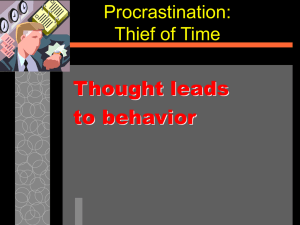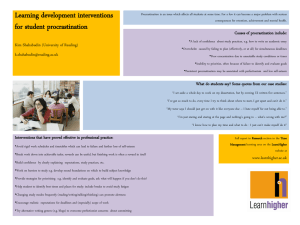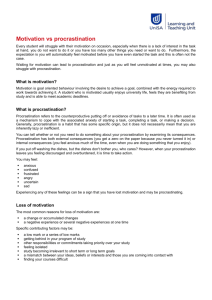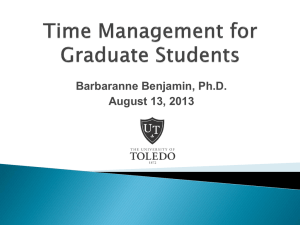Procrastination and How to Beat it
advertisement
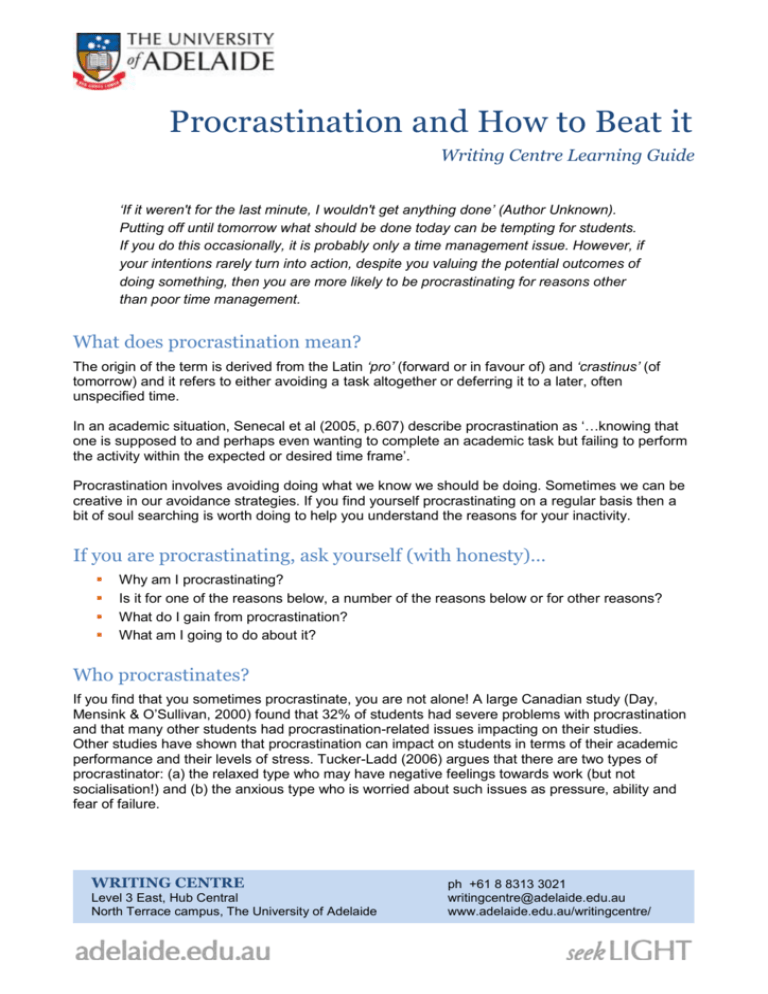
Procrastination and How to Beat it Writing Centre Learning Guide ‘If it weren't for the last minute, I wouldn't get anything done’ (Author Unknown). Putting off until tomorrow what should be done today can be tempting for students. If you do this occasionally, it is probably only a time management issue. However, if your intentions rarely turn into action, despite you valuing the potential outcomes of doing something, then you are more likely to be procrastinating for reasons other than poor time management. What does procrastination mean? The origin of the term is derived from the Latin ‘pro’ (forward or in favour of) and ‘crastinus’ (of tomorrow) and it refers to either avoiding a task altogether or deferring it to a later, often unspecified time. In an academic situation, Senecal et al (2005, p.607) describe procrastination as ‘…knowing that one is supposed to and perhaps even wanting to complete an academic task but failing to perform the activity within the expected or desired time frame’. Procrastination involves avoiding doing what we know we should be doing. Sometimes we can be creative in our avoidance strategies. If you find yourself procrastinating on a regular basis then a bit of soul searching is worth doing to help you understand the reasons for your inactivity. If you are procrastinating, ask yourself (with honesty)… Why am I procrastinating? Is it for one of the reasons below, a number of the reasons below or for other reasons? What do I gain from procrastination? What am I going to do about it? Who procrastinates? If you find that you sometimes procrastinate, you are not alone! A large Canadian study (Day, Mensink & O’Sullivan, 2000) found that 32% of students had severe problems with procrastination and that many other students had procrastination-related issues impacting on their studies. Other studies have shown that procrastination can impact on students in terms of their academic performance and their levels of stress. Tucker-Ladd (2006) argues that there are two types of procrastinator: (a) the relaxed type who may have negative feelings towards work (but not socialisation!) and (b) the anxious type who is worried about such issues as pressure, ability and fear of failure. WRITING CENTRE Level 3 East, Hub Central North Terrace campus, The University of Adelaide ph +61 8 8313 3021 writingcentre@adelaide.edu.au www.adelaide.edu.au/writingcentre/ Why do students procrastinate? There is no single answer to this. The same students might procrastinate for different reasons at different times. However, research in the area has demonstrated some common indicators. Procrastination appears to be a problem of motivation rather than a time management issue. If students have the motivation to do a particular task, either intrinsic or extrinsic, they are less likely to procrastinate. The value placed on the task correlates with the likelihood of procrastination. Fear of failure is a recurring theme. For some, it can be seen as more desirable to fail a task due to lack of effort rather than completing a task and demonstrating a lack of ability. There is often a correlation between procrastination and low self-esteem. Students who have a negative perception of their own academic abilities often ‘live out’ their perception through procrastinating to avoid any possible confirmation of their perceived inabilities. Other issues which can cause students to procrastinate when given a task include: the task is too big unclear relevance of task to results not knowing what to do Procrastination lack of self-discipline inability to set priorities fear of success unrealistic expectations Further explanation 2 The task appears too big - where the student sees the task as a whole, rather than in a series of stages. Thus, looking at the task from this ‘big picture’ angle can make it seem unmanageable. Not knowing what to do - many students are not really sure what a task involves and consequently fail to act. Inability to set priorities - this involves not setting up priorities in relation to doing the task itself, but setting it off against other competing tasks, obligations and wants. Having unrealistic expectations - this is often linked with the concept of perfectionism and relates to students being unreasonably demanding of themselves in terms of attaining high academic grades. This can be especially true for students transitioning from a schoolbased environment where marking criteria can be different. Fear of success and its consequences - the idea that success breeds success can be confronting to many students. If a student performs well once, then that expectation will hold for future assignments. Moreover, success can also lead to the unknown, where students can be outside their comfort zones. Lack of self-discipline - transitioning from a nurturing study environment like high school to the autonomy of university can see many students struggle to become independent learners. Unclear relevance of task to results - if a task is not seen as being important to the overall grade in a given course, then it is tempting not to give it any emphasis, despite the fact that it might have other learning/content related relevance. What can you do to overcome your inner procrastinator? The task appears too big - break down the task into manageable chunks. Only give yourself small, achievable goals such as reading one article at a time and take regular breaks between tasks. If you make your goals too big, you run the risk of being unable to meet them. Work upwards from small and simpler tasks; successful achievement can help you to tackle the more challenging ones. Not knowing what to do - if you do not know what the task requires of you, it is important to find out sooner rather than later. Your tutors/lecturers will see your request in a positive light, as representing a desire for understanding. Knowledge is seen to be advanced through the asking of questions, so see this as a natural part of the research process rather than a knowledge deficit. Inability to set priorities - this is one of the most significant causes of procrastination. You don’t get round to doing something because you do not have time to do so. If this statement feels true for you, then it is important to examine and reorganise your priorities, both in terms of task/event and time taken in relation to them. Create a system of prioritising your commitments. Having unrealistic expectations - this is particularly true for students in transition from high school to university. Perhaps at school you have been a perennially high achiever, yet at university your grades might be much lower. The demands of evidence based academic writing in a university context are often great and if your marks have not been what you would have expected, it is worth remembering that you are ‘serving an apprenticeship’ in academic writing and you will improve with experience. Fear of success and its consequences - success might require you to do other things over which you have less control, such as giving public presentations. Moreover, success might not correlate with ‘coolness’; the thought of you being deemed a ‘nerd’ might be an uncomfortable one. Whatever the reason, success can take us out of our comfort zones, so stay calm and seek assistance. Lack of self-discipline - if a lack of self-discipline is contributing towards procrastination, then it might be because you are not used to being in charge of your own agenda. In high school you were told what to do and when to do it; and if you did not complete a task there were often immediate negative consequences. At university, the negative consequences can seem much more distant. Provide your own positive incentives for doing work, perhaps in the form of a reward for task completion. By putting a reward system in place you are invoking a form of self-discipline which you can build upon. Unclear relevance of task to results - sometimes you might procrastinate because the task might not be formally assessed and thus appear less worthy of your attention. However, in such a scenario, it is important to remember that whilst the task might not be assessed, there is significant value in completion of such tasks as part of the greater learning picture. Certainly, the skills, strategies and understandings gained could serve you well for future assessed tasks. 3 References Day, V., Mensink, D., & O’Sullivan, M. (2000). Patterns of academic procrastination. Journal of College Reading and Learning, 30, 120-134. Senecal, C., Koestner, R., & Vallerand, R. (1995). Self-regulation and academic procrastination. The Journal of Social Psychology, 133(5), 607-619. Tucker-Ladd, C. (2006). Psychological self-help, (Chapter 4: Behaviour motivation and self control) viewed 2 March 2009, <http://www.psychologicalselfhelp.org/> Some useful links http://www.adelaide.edu.au/counselling_centre/resources/brochures/procrastination.html http://www.brad.ac.uk/acad/management/external/els/pdf/procrastination.pdf Counselling Service If you are feeling anxious, you can seek assistance. Have a look at the section called Reframe Your Thinking, produced by the University of Adelaide Counselling Service at: http://www.adelaide.edu.au/counselling_centre/resources/brochures/procrastination.html. Or you may prefer to make a personal consultation time with one of the counsellors by ringing 8313 5663. © The University of Adelaide 2014 4
